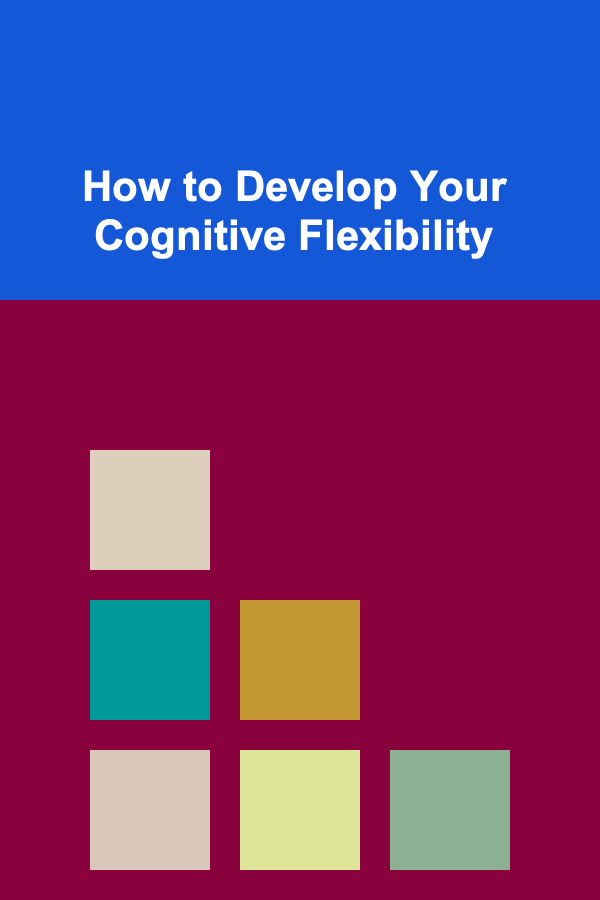
How to Develop Your Cognitive Flexibility
ebook include PDF & Audio bundle (Micro Guide)
$12.99$8.99
Limited Time Offer! Order within the next:

Cognitive flexibility, often described as mental agility, is the brain's ability to adapt to new information, switch between thinking about different concepts, and think about multiple concepts simultaneously. It's a crucial aspect of intelligence and decision-making and can be developed over time through targeted practices. Cognitive flexibility allows individuals to process information more efficiently, cope with change, and solve problems creatively. This article explores cognitive flexibility, why it is important, how it functions, and how you can cultivate it to enhance your overall cognitive abilities.
Understanding Cognitive Flexibility
Cognitive flexibility refers to the mental ability to switch between different thoughts or actions depending on the context. It is essential in navigating life's complexities, as it allows individuals to adapt quickly to new environments, tasks, or information. Unlike rigid thinking, which limits an individual's ability to adapt, cognitive flexibility enables a person to reevaluate assumptions, try alternative methods, and apply different perspectives when solving problems.
Cognitive flexibility is often discussed in the context of executive function, a set of cognitive processes that help individuals plan, make decisions, solve problems, and regulate their behaviors. These skills rely on the prefrontal cortex, a region of the brain responsible for higher-order thinking and decision-making. Cognitive flexibility plays a role in various cognitive tasks, including learning, memory, attention, and reasoning.
Importance of Cognitive Flexibility
The benefits of cognitive flexibility are far-reaching and can influence various aspects of our lives. These include:
- Problem-Solving: Cognitive flexibility allows individuals to approach problems from different angles, which enhances creativity and the ability to find solutions in unfamiliar or complex situations.
- Adaptability: Life is constantly changing, and being able to adapt to new situations is key to personal growth, career development, and overall well-being. Whether it's shifting work priorities or handling unexpected events, cognitive flexibility helps individuals cope with change.
- Improved Learning: Those with cognitive flexibility are more likely to grasp new concepts, learn from mistakes, and adjust their learning strategies. This allows for deeper understanding and more effective application of knowledge.
- Better Emotional Regulation: Cognitive flexibility aids in recognizing and adjusting thoughts and behaviors in response to emotions, helping individuals to manage stress, anxiety, and other emotional responses in a healthy manner.
- Social Interaction: Effective communication and understanding others' viewpoints often require flexibility in thinking. Cognitive flexibility allows individuals to switch perspectives and empathize with others, improving relationships and social dynamics.
The Role of the Brain in Cognitive Flexibility
Cognitive flexibility is closely tied to the brain's ability to shift attention, adapt strategies, and integrate new information. It primarily involves the prefrontal cortex, which governs decision-making, planning, and control over actions. This brain region enables individuals to disengage from habitual responses and consider new possibilities.
Additionally, other parts of the brain, such as the parietal cortex and basal ganglia, contribute to cognitive flexibility by supporting the ability to switch between tasks, update information, and integrate sensory input. Through these neural networks, the brain is able to rapidly adjust its processes to suit changing circumstances.
How Cognitive Flexibility Develops
Cognitive flexibility does not develop overnight. It is shaped by both genetics and experiences. From a developmental perspective, children's cognitive flexibility improves as they grow, particularly during adolescence when the prefrontal cortex matures. However, cognitive flexibility can continue to develop throughout life, especially when one engages in activities that challenge the brain and require adaptive thinking.
It's also important to note that cognitive flexibility can decline with age. As the brain experiences changes due to aging or certain neurological conditions, such as Alzheimer's disease or Parkinson's disease, cognitive flexibility may become more difficult to maintain. However, with practice and intentional strategies, cognitive flexibility can be preserved and even improved in older adults.
Strategies to Improve Cognitive Flexibility
Improving cognitive flexibility is a process that requires both mental and physical efforts. Below are some strategies and activities that can help enhance cognitive flexibility:
1. Mindfulness and Meditation
Mindfulness exercises and meditation are excellent tools for developing cognitive flexibility. These practices train the brain to be more aware of thoughts and feelings, allowing individuals to recognize when they are fixated on a particular thought or response. Mindfulness fosters mental awareness, helping individuals disengage from rigid thought patterns and develop greater mental agility.
Mindfulness meditation has been shown to increase gray matter density in the brain, particularly in areas related to executive function. Studies suggest that people who practice mindfulness regularly exhibit greater cognitive flexibility, as they are better able to regulate their attention and switch between tasks.
2. Exposure to New Information and Experiences
The brain thrives on novelty. The more varied the information or experiences we expose ourselves to, the more our brains can practice adjusting to new challenges. Reading books, watching documentaries, traveling, learning new skills, or engaging in conversations with people from diverse backgrounds all help in expanding the brain's ability to process and adapt to new information.
When you expose yourself to a variety of ideas and experiences, your brain learns how to apply previous knowledge to new contexts and how to adjust to unfamiliar situations. This boosts cognitive flexibility by encouraging the brain to make new connections and shift perspectives.
3. Practice Problem-Solving and Brain Games
Engaging in activities that require problem-solving and decision-making is one of the most effective ways to develop cognitive flexibility. Puzzles, riddles, and strategy games such as chess or Sudoku force the brain to think creatively and adjust strategies to find the solution. These games are ideal for stimulating cognitive flexibility because they require the brain to consider multiple factors simultaneously, switch between strategies, and adapt to new information.
Additionally, complex video games that involve decision-making and strategic thinking can help improve cognitive flexibility. The rapid pace of action in many video games requires players to quickly adapt to new circumstances and make strategic decisions, providing a workout for cognitive flexibility.
4. Journaling and Self-Reflection
Journaling and engaging in self-reflection exercises can also boost cognitive flexibility. Writing about experiences, emotions, and thoughts allows individuals to step back and reframe situations from different perspectives. This act of reflection promotes the development of flexible thinking because it encourages one to consider alternative viewpoints and rethink entrenched beliefs.
For example, writing down how you would approach a particular problem in multiple ways, or considering a situation from someone else's perspective, can help expand mental flexibility. This exercise also encourages emotional regulation by helping individuals manage their reactions to various experiences.
5. Physical Exercise
Physical exercise, particularly aerobic exercise, has been shown to improve cognitive function and promote neuroplasticity. Regular physical activity increases blood flow to the brain, encourages the growth of new neurons, and enhances the brain's ability to form new neural connections. These changes in the brain support cognitive flexibility by allowing the brain to adapt more easily to new challenges.
In addition to aerobic exercise, activities that require coordination, such as dance or team sports, can further enhance cognitive flexibility by forcing the brain to process and integrate sensory information from different parts of the body.
6. Learn a New Language
Learning a new language challenges the brain to process information in novel ways. It requires the brain to switch between linguistic systems and adapt to new grammatical structures, vocabulary, and phonetic patterns. Studies have shown that bilinguals tend to exhibit greater cognitive flexibility, as their brains are used to switching between languages and handling complex linguistic rules.
Incorporating language learning into your routine, even at a basic level, can help enhance cognitive flexibility by improving the brain's ability to manage competing information and adjust to different cognitive demands.
7. Developing Emotional Regulation Skills
Cognitive flexibility is not just about adjusting to external tasks but also about managing internal processes, such as emotions. Developing emotional regulation skills can improve your ability to shift perspectives, adapt your thinking, and make better decisions. This involves recognizing when you are experiencing strong emotions and learning how to manage them in a way that promotes flexible thinking.
Techniques such as deep breathing, progressive muscle relaxation, or cognitive reframing can help regulate emotions and foster cognitive flexibility by preventing the brain from becoming locked into rigid emotional responses.
8. Seeking Feedback and Constructive Criticism
One of the most effective ways to foster cognitive flexibility is by seeking feedback from others. Whether it's feedback on work, personal projects, or social interactions, receiving input from others allows individuals to view a situation from multiple angles. Constructive criticism encourages individuals to adjust their thinking and consider alternative methods or strategies.
Embracing feedback, especially from diverse sources, can challenge preconceived notions and promote adaptive thinking. Rather than feeling defensive, viewing feedback as an opportunity for growth can strengthen cognitive flexibility and help you develop more effective solutions.
9. Cultivating a Growth Mindset
Adopting a growth mindset is central to developing cognitive flexibility. A growth mindset involves believing that intelligence and abilities can be developed through effort and learning. This belief encourages individuals to embrace challenges, learn from mistakes, and persist in the face of difficulties.
People with a growth mindset tend to approach problems with curiosity and adaptability rather than rigidity, as they believe that they can improve with time and practice. Cultivating this mindset encourages a flexible approach to problem-solving and fosters resilience.
Conclusion
Cognitive flexibility is a vital skill that can enhance problem-solving, learning, emotional regulation, and adaptability in all areas of life. By engaging in a variety of activities that challenge the brain, cultivating emotional regulation, and embracing new experiences, you can improve your cognitive flexibility over time. Whether through mindfulness, brain games, learning new skills, or practicing self-reflection, there are numerous ways to develop mental agility and become more adept at adapting to an ever-changing world.

How to Organize Your Kitchen for Maximum Efficiency
Read More
How to Prepare Your Home for Seasonal Allergies with Smart Organizing
Read More
Why Organizing Your Digital Space Is Just as Important as Your Physical Space
Read More
How to Write Profitable Grant Proposals
Read More
How To Promote Financial Literacy in Kids
Read More
How to Evaluate a Film's Audience Engagement
Read MoreOther Products

How to Organize Your Kitchen for Maximum Efficiency
Read More
How to Prepare Your Home for Seasonal Allergies with Smart Organizing
Read More
Why Organizing Your Digital Space Is Just as Important as Your Physical Space
Read More
How to Write Profitable Grant Proposals
Read More
How To Promote Financial Literacy in Kids
Read More